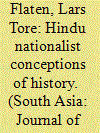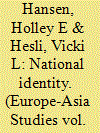|
|
|
Sort Order |
|
|
|
Items / Page
|
|
|
|
|
|
|
| Srl | Item |
| 1 |
ID:
105685


|
|
|
| 2 |
ID:
105454


|
|
|
|
|
| Publication |
2011.
|
| Summary/Abstract |
Divided cities within contested states are a category in their own right, in that their division is driven by issues of national sovereignty as well as ethnic, religious and linguistic cleavages. Reconstituting them as integrated urban spaces, therefore, requires policy shifts on many levels-local, municipal and state-but too often these are hampered by fears of loss of sovereignty and external domination. The case of Jerusalem in the Palestinian-Israeli conflict is a prime example of how national sovereignty issues can be seen as having an impact upon urban divisions. One option that is proposed for the resolution of this conflict, which has generated intense debate on both sides, is that of a binational Israeli-Palestinian state. This article argues that there is a false dichotomy concerning the competing benefits of binational and two-state models in the Palestinian-Israeli conflict. It contends, on the one hand, that the binational model comprises many forms, some of which are more confederal in structure. On the other hand, for the two state model to function effectively a high degree of interstate coordination is required which brings it close to some forms of confederalism. The article examines the discussions on divided Jerusalem to explore this argument and highlights the degree of interstate coordination that is required if any of the plans being put forward for the future of the city are to work. It concludes by relating the Jerusalem example to the wider issue of divided cities in contested states.
|
|
|
|
|
|
|
|
|
|
|
|
|
|
|
|
| 3 |
ID:
114659


|
|
|
|
|
| Publication |
2012.
|
| Summary/Abstract |
In this article, I seek to examine some key mechanisms underlying the dichotomisation between Hindus and Muslims in Hindu nationalist history writing. Two arguments are central to this study. One is that the strict dichotomisation between Hindus and Muslims presupposes homogeneous categories. This is particularly clear if one examines how Hindu nationalist intellectuals made sense of ambiguities, of individuals and cultural traditions that did not fit directly into the categories, 'Hindus' and 'Muslims'. Moreover, I discuss the role of the so-called hidden 'Others'. I argue that these hidden 'Others' represent, in the form of alternative principles of grouping, the largest obstacle to the Hindu nationalist construction of a Hindu-Muslim dichotomy, both at the political level and within the field of history writing.
|
|
|
|
|
|
|
|
|
|
|
|
|
|
|
|
| 4 |
ID:
086232


|
|
|
|
|
| Publication |
2009.
|
| Summary/Abstract |
We challenge the civic-ethnic dichotomy drawn by previous authors and propose a four-category typology of identities based on out-group tolerance and in-group attachment. Drawing from work on national identity formation and nation-building, we test hypotheses about the processes that cause individuals to adopt one identity over others using survey data based on representative samples of five ethnic groups in Ukraine. We find that the effects of socialisation processes vary greatly depending upon ethnic group. Our results challenge some long-held assumptions about the potential destabilising effects of 'ethnic' identities and the degree to which 'civic' identities correspond to values and behaviours supportive of democracy.
|
|
|
|
|
|
|
|
|
|
|
|
|
|
|
|
| 5 |
ID:
106884


|
|
|
| 6 |
ID:
099478


|
|
|
| 7 |
ID:
131701


|
|
|
|
|
| Publication |
2014.
|
| Summary/Abstract |
This article addresses the problématique of the subject and the subject-object dichotomy from a post-objectivist, reflexivist perspective informed by a 'strong' version of reflexivity. It clarifies the rationale and epistemic-ontological requirements of strong reflexivity comparatively, through a discussion of autoethnography and autobiography, taken as representatives of other variants of reflexive scholarship. By deconstructing the ontological, epistemic, and reflexive statuses of the subject in the auto-ethnographic and auto-biographical variants, the article shows that the move from objectivism to post-objectivism can entail different reconfigurations of the subject-object relation, some of which can lead to subjectivism or an implicit positivist view of the subject. Strong reflexivity provides a coherent and empowering critique of objectivism because it consistently turns the ontological fact of the social situatedness of knowledge into an epistemic principle of social-scientific research, thereby providing reflexivist scholars with a critique of objectivism from within that allows them to reclaim the philosophical, social, and ethical dimensions of objectivity rather than surrender them to the dominant neopositivist tradition.
|
|
|
|
|
|
|
|
|
|
|
|
|
|
|
|
|
|
|
|
|